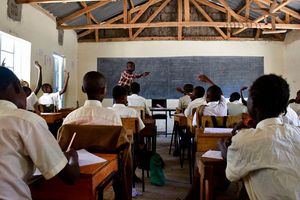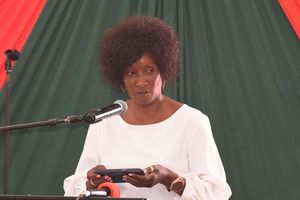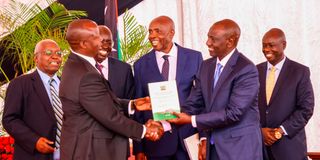
President William Ruto (right) presents a copy of the report by the Presidential Working Party on Education Reform to Julius Melly, the chair of the Education Committee of the National Assembly, flanked by Education CS Ezekiel Machogu (2nd right), PS Belio Kipsang and Prof Raphael Munavu (left) at State House, Nairobi.
When he delivered his inaugural speech as President soon after taking the oath of office, William Ruto made a raft of pledges on things he needed to accomplish. He listed education as one of the key priority areas.
The President followed up his pledge by appointing, two weeks later, the Presidential Working Party on Education Reforms to look into issues concerning the education sector from pre-school to tertiary education.
The team has since presented its report, parts of which are already under implementation, with varying degrees of success.
However, as schools opened for the new academic year this week, heads of schools, which are steeped in debt, were grumbling about capitation deficits, intern teachers deployed in junior schools are complaining about their employment terms, the implementation of junior school is in trouble, while questions linger over national examinations after complaints were raised following the release of results of the Kenya Certificate of Primary Education (KCPE) exam in December 2023 and the Kenya Certificate of Secondary Education (KCSE) exam this week.
“Commitment by the government to the provision of quality education is essential. Education is a fundamental right, a public good and inclusivity is crucial, including in terms of gender. There must be a sense amongst the people that they are being included. This sense is so powerful that in its absence, people start questioning the type of education their children are receiving,” said Joseph Wasikhongo, the national coordinator of the Elimu Yetu Coalition.
Indimuli Kahi, the former chairperson of the Kenya Secondary Schools Heads Association, told Saturday Nation that there are numerous complaints by schools concerning the KCSE results released this week.
“There are both silent and loud complaints that some schools don’t accept the results. There’s an issue that needs to be investigated. Principals become the easier target when results are unsatisfactory, but we can’t sweep things under the carpet. The Kenya National Examinations Council (Knec) needs to look into the complaints,” he said.
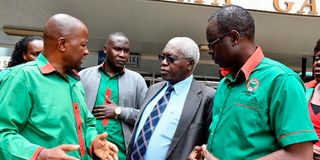
From left: Kenya National Union of Teachers (KNUT) Nairobi Branch Chairman Nyamai Kasina, KNUT National Assistant Executive Alvans Washington, Presidential Working Party on Education Reform Chairperson Prof. Raphael Munavu and KNUT Nairobi Branch Secretary Macharia Mugwe confer with one another during public hearings on education reforms held at the University of Nairobi (UoN) Taifa Hall on November 11, 2022.
The council has also been taken to account by some parents over the results of the Kenya Primary School Education Assessment, which was administered at the same time with the KCPE exam in November last year. This is despite the fact that Knec CEO David Njeng’ere announced on Monday that the individual learner reports and school-specific reports are accessible on the Knec portal.
The assessment has no bearing on progression to junior school as all the learners’ progress, but the message seems to have never been well communicated to the public. To its credit, the council has administered the highest number of national examinations over the last three years.
Jonathan Wesaya, the lead technical consultant at Tathmini Consulting, faulted the Kenyan education system for wastage as witnessed by the number of learners who drop out along the way. This is despite government efforts to achieve a 100 per cent transition rate at various exit points within the system.
Data from the ministry shows that close to 200,000 who transited to secondary school in 2020 did not sit the KCSE examination.
Also Read: The evolution of Kenya’s education system
“The just-released exam results showed that 54.72 per cent of the candidates scored D+ (plus) and below. Three thousand candidates failed to show up for the examination. That is all that was mentioned and without telling the nation who is supposed to be held to account and what tracing mechanism has been put in place to ensure they are not lost in the labyrinth of issues in the education sector, especially for those that failed to sit the exams for one reason or the other,” he said.
Junior mess
The implementation of junior school is far from smooth. Yesterday, Education Cabinet Secretary Ezekiel Machogu issued a circular warning head teachers against alleged collection of illegal levies “on the pretext of expanding infrastructure to accommodate learners joining Grade 8”.
He also directed that those joining Grade 7 be allowed to use their primary school uniform in junior school as parents make efforts to buy new outfits.
“The government plans to spend Sh12.8 billion to facilitate the construction of 15,015 classrooms for junior schools over the next one year,” Mr Machogu said.
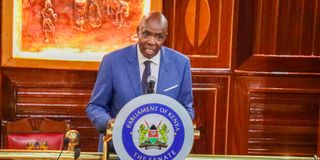
Education Cabinet Secretary Ezekiel Machogu fields questions from members of the Senate at Parliament Buildings in Nairobi on August 9, 2023.
Johnson Nzioka, the chair of the Kenya Primary Schools Heads Association, confirmed that the schools have received the capitation for junior sections but not for primary sections. He said head teachers should be allowed to charge parents to cover for what the government funds could not.
“People want to support a programme that they have had problems implementing. What’s wrong with asking for something little, say to employ enough workers? However, the heads should plan with what they have been given,” he said.
He said school heads are deploying teachers meant for primary school to teach junior school if they are qualified to do so, as they await recruitment of more teachers. Many primary schools now have excess manpower with the absence of Standard 7 and 8.
Funding of education programmes remains a thorny issue. Mr Kahi said the funding of the Free Day Secondary Education programme has a deficit of Sh58 billion unremitted to schools since 2019 and, as a result, the institutions have accumulated huge debts. He opposed budget cuts on claims that principals misuse the money allocated for learners.
“Do you reduce money because principals are misusing it? Deal with the guilty ones. We’ve been relying on the goodwill of suppliers and when that goodwill wanes, many schools will be taken to court. Parliament has to be compelled to appropriate funds for education,” he said.
Heads of primary schools have also over time been lobbying for an increase of capitation for learners that has remained capped at Sh1,420 since the inception of the programme by the Mwai Kibaki administration in 2003.
8-4-4 learners
Meanwhile, Mr Wasikhongo warned against neglecting the remaining learners under the 8-4-4 system. According to him, focus and resources are directed at the learners under the Competency-Based Curriculum at the expense of the four classes still under 8-4-4.
“How do we forestall the danger of having a ‘lost generation’? On this, we ask the government to give an assurance that this generation of learners is not neglected and that its future is adequately taken care of,” he said.
The Kenya Kwanza administration promised to employ 116,000 in two year. Over the last one year, it has hired 56,000 teachers.
However, the majority of them (about 46,000) have been recruited as interns and huge gaps still exist.
They had initially been hired on a one-year contract, which has been extended until the end of the year, with a promise of absorption into the service on permanent and pensionable terms.
Some of the interns have protested against the move and there is a case in court seeking to compel the commission to employ them.


